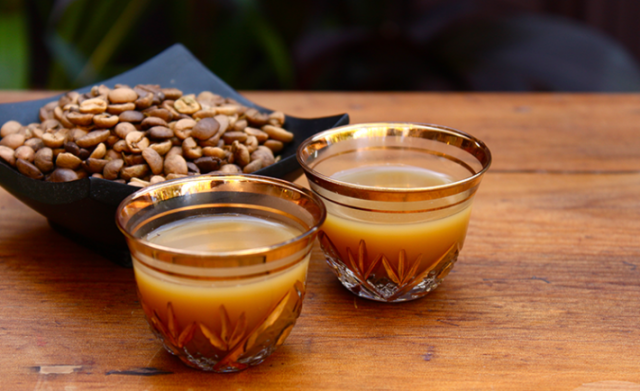Ask for Arabic coffee at a coffee shop in Qatar and you’ll get a small cup of an aromatic, gold-hued beverage commonly referred to as qahwa in Arabic (pronounced gahwa).
The best quality green coffee beans are purchased from wholesale shops, many of which can be found in Souq Waqif, along with the other traditional ingredients : saffron, cardamom, cloves and dried shaiba leaves (black stone flower). Saffron, being the most expensive ingredient, is chosen carefully or sourced from Iran. The retailer can roast and grind the beans if requested but many people choose to do it themselves. Additional ingredients can be added, with ratios varying from family to family. Even the colour of the coffee differs, with some preferring lighter tones and others, darker ones. To make qahwa like a local, follow the steps below:
1. In a mihmas (roasting spoon) roast the coffee to the desired hue over a flame. Heat water in a khumrah (large coffee pot).
2. Cool the roasted beans in a mubarrid (wooden container), and grind in a hawan (mortar and pestle), ringing occasionally to add some musicality to the ritual. The grounds should be slightly coarse to avoid residue in the finjan (small cup). Or you can dispense with this part of the ritual and use a coffee grinder.
3. Add the ground coffee to the boiling water in the khumrah along with ground cardamom and other spices according to preference. Let simmer.
4. Transfer the coffee into a dallah (coffee pot). To keep it authentic, insert an organic sieve woven from palm trees into spout of the dallah, or use that strainer from the local store as you pour.
5. Pour the coffee into fanajin (plural of finjan, which you now know are tiny cups without handles) and enjoy with kholas (dates) which are preferred for their mild toffee flavour. Dates not your thing? Anything sweet will do to complement the bitterness of the coffee.







